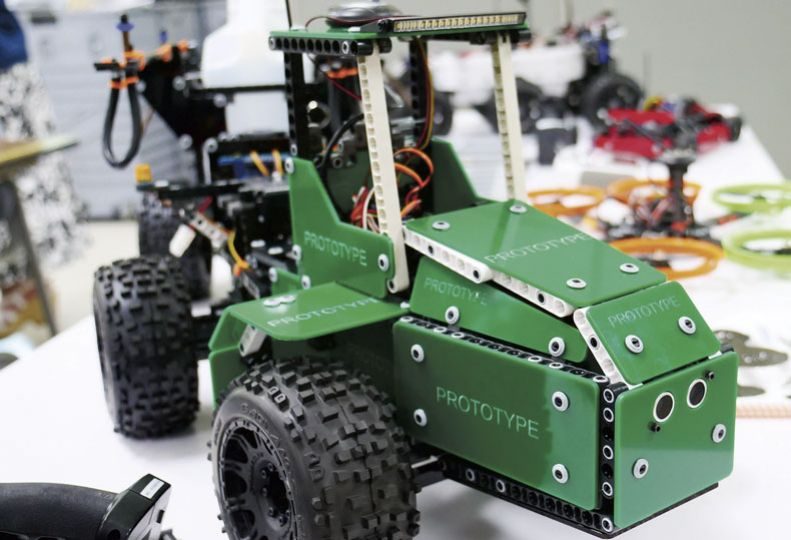
Home » Minds-i engineers new ag-tech device
Minds-i engineers new ag-tech device
Self-driving farm tractor could be entry into new market for Liberty Lake company

July 6, 2023
Minds-i Inc., a Liberty Lake robotics, drone, and education resources company, is gearing up to release a new self-driving robot that could launch the company into the agricultural-technology market, say husband-and-wife cofounders Mike and Christy Marzetta.
“We’re going to open up a new market niche that doesn’t exist yet,” says Mike Marzetta, who is also president of Liberty Lake-based contract advanced manufacturer Altek Inc.
Minds-i manufactures and sells robot-building materials for outdoor use with accompanying engineering, coding, and programming lessons to school districts, nonprofits, and other educational entities.
The products are designed to engage students with hands-on science, technology, engineering, and math exercises.
“This is really about industry preparedness,” says Marzetta.
He says Minds-i differentiates itself from the competition by focusing on durable products for the outdoors, including devices for teaching about agriculture and space exploration.
“We’re trying to open up the outdoor education market, which doesn’t really exist right now,” he says. “There’s nothing for farming because farming is done outside, and all the current systems only work inside.”
Marzetta says he wants Minds-i to become competitive with The Lego Group and Vex Robotics Inc., which have been dominating robotics education for years.
Minds-i earns about $1 million in annual revenue due to the success of its popular unmanned aerial vehicle learning and competition kits.
Demand for its ice chest-sized, four- and six-wheel rovers also has been increasing in the last year, he says.
In the next few months, Minds-i’s working prototype of a scaled-down, self-driving farm tractor will be tested by agricultural professionals at a couple of U.S. ag trade shows, Marzetta says.
Once feedback is received, the tractor’s components will be finalized, and the company will publish an accompanying learning curriculum for educators, he says.
“This will have an autonomous farming curriculum that goes with it that we’re developing right now,” he says.
Marzetta anticipates a market-ready version by the start of the 2024-25 school year.
Schools and nonprofits with STEM-related programs can purchase robotics kits through a network of dealers.
Each kit will support a handful of students. Step by step technical guides are provided to walk both teachers and students through the build project.
Levi Wilson, director of technology and curriculum development for Minds-i, says the autonomous farming vehicle will be able to perform the same functions as a life-sized tractor at a fraction of the cost.
The self-driving robotic tractor kit will cost about $3,000, which Marzetta says is significantly less expensive than the roughly $300,000 cost of purchasing a full-size farming tractor with a self-driving function.
Minds-i robotic learning kits arrive unassembled. Educators give students various assignments to construct the robots in a variety of configurations depending on the goals of the lessons.
Wilson says students will learn about the mechanics of farming equipment through the assembly of the robot tractor. He says the lessons can go further to incorporate real-world driving scenarios, such as cornering and accessory components including lighting and signage.
“The kids are the ones who build it and program it,” Wilson says. “A lot of the stuff will be based off of real situations.”
Components of the robotic learning labs are manufactured at the Altek Inc. headquarters, located at 22819 E. Appleway, in Liberty Lake, where Minds-i occupies about 3,500 square feet of office and warehouse space inside the 140,000-square-foot building, says Christy Marzetta, vice president of Minds-i.
Mike Marzetta says he has shares of ownership in both companies, but Minds-i is a client of Altek, a contract advanced manufacturing company.
Altek manufactures the majority of the robot components for Minds-i through machining and plastic injection molding processes.
The robotic components are assembled with the company’s patented interlocking system of connectors, beams, gears, and panels.
Marzetta says, “We manufacture everything here at Altek with the exception of the electronics.”
Minds-i has been developing self-driving technology for its scalable robotic vehicles for five years, he says.
“Self-driving is not easy. There’s a reason only Fortune 500 companies seem to be (working on it),” he says.
It’s been challenging to stay focused on developing practical products that educators want for their students, because ideas for new applications are emerging constantly, he says.
“We have a million ideas for things,” Marzetta says. “We’re trying to focus those down to a viable product that somebody wants.”
The company’s drone kit is getting revamped to incorporate agricultural uses that can be useful on its own, or in conjunction with the tractor, he adds.
The company also is working on instructional videos to offer another learning method for each robotic kit.
Marzetta says demand for robotic learning labs is steady, as thousands of students have assembled Minds-i’s robotic builds.
“We’ve got a pretty good, steady stream of product going out the door, but we’re still a speck of dust,” compared to competitors, he says.
Minds-i has seven employees.
Christy Marzetta, whose background is in the insurance industry, says the couple had full-time jobs when they formed the company 17 years ago, but they wanted an outlet “to have fun and make a difference.”
She says, “We had all these ideas for things we could start or do. That list was whittled down to Minds-i.”
Mike Marzetta says the company has been exploring military applications for future commercial offerings.
He says that down the road, the company’s path eventually will lead to commercial products, “for military, or firefighting, or construction, or exploring mines, or exploring building wreckages.”
Until then, the Marzettas say that Minds-i will focus on growing partnerships with nonprofits, such as Skills USA, a national education association that helps prepare students from middle school through college with technical and skills training that employers need.
Wilson says, “The number one goal is to keep kids engaged, but then get something that the schools are always looking for… a certification or something like that gives them an advantage when they leave high school.”
In the ag industry, robotics learning labs will be ideal for partnerships with nonprofit organizations such as 4-H Club and Future Farmers of America, Mike Marzetta says.
“Most of those nonprofits are starting to adopt robotics farming, and the stuff they’re doing is elementary compared to what we can offer them,” he says. “That market has no established product in it. So, we’ll see.”
Latest News Up Close Manufacturing Technology
Related Articles
Related Products





